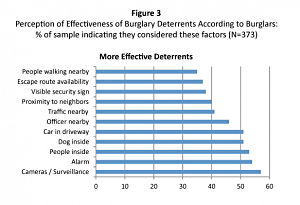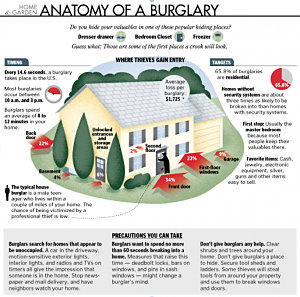Burglars Don’t Want You to Put Video Cameras in These 3 Spots…
You know what burglars hate the most?
Security/surveillance cameras.
A study shows that of all the security measures you could take to protect your home, installing video cameras are the most effective—even more so than having an officer nearby.
Who needs cops when you can have a security camera watching your back 24/7?
The question then becomes, “Where do you place those surveillance cameras for maximum effectiveness?”
The answer: Near common break-in points. The places where you’re most likely to catch burglars in the act and record their faces.
According to the Washington Post, burglars are most likely to get into your home through 3 spots:
- Front door – 34%
- First floor window – 23%
- Back door – 22%
“Wait, why is the front door the most common break-in point?”
Great question!
Here’s what typically happens: During the day, a burglar will knock on the front door to see if anyone is home. If someone answers, the burglar just makes up some excuse, “Hey my phone died, and I need directions. Can you help?”
If no one answered the door, however, they’ll assume no one is home and kick the door in, find your valuables and make off like the bandit they are.
The key here is that someone approaching the front door does not seem too suspicious. And if someone opens the door, then they can have an excuse. Basically, the front door is less risky.
Regardless, you should cover all your bases by putting cameras near these 3 common break-in points.
How to buy a home security camera
You might be thinking, “OK this sounds cool and all, but I don’t know a thing about buying security cameras.”
That’s fine! We can help.
We suggest buying smart video cameras, which can both record video and let you see a live stream from your smart phone. So, you can see what’s going on at home, when you’re away from home.
When looking for a smart security camera system, consider these features and their uses:
- Infrared vision (or night vision) — Allows you to see video in the dark. Especially useful if your camera is for security and will be placed outside.
- Wireless — Most smart video cameras connect over Wi-Fi. But even wireless cameras will need a power source, so they won’t be completely wireless.
- HD recording — Captures video in high-definition for better clarity of what’s going on in your home.
- Local vs. cloud recording — Do you want your videos stored in the cloud where you can access them wherever you want? Or do you want them stored on your computer at home?
- Angle of view — This is measured in degrees. The bigger the angle, the wider area your camera will capture.
- Motion capture — Have your camera record whenever it detects motion.
- Compatibility with existing systems — If you want to tie in the camera to your security system, make sure it’s compatible with the equipment you already have.
Want to make your metro Atlanta home safer? We can help.
Talk to us about custom, affordable security systems, which can include smart security cameras.
Related Reading
Subscribe To Our Newsletter
Get up-to-date current news, promotions, and industry tips.


